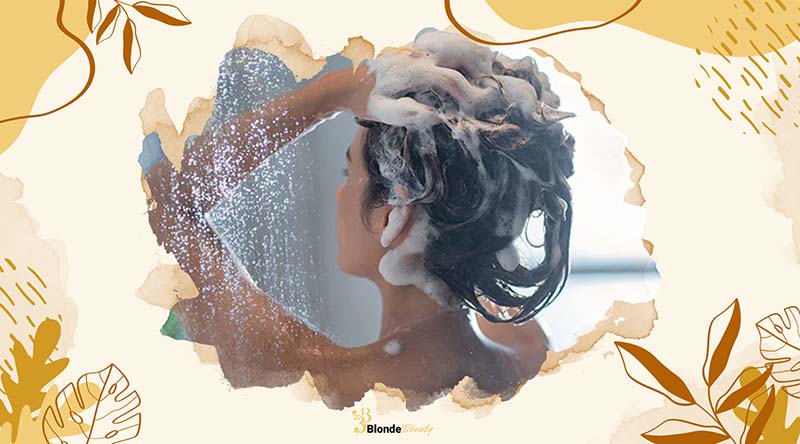Beachy waves have a natural, effortless beauty, but the impact of salt water on your hair is a topic worth exploring.
This blog investigates “Is salt water good for hair?”, examining both the advantages and the challenges it presents. By understanding the effects of salt water, you can make better choices to keep your hair looking its best.
Is Salt Water Good for Hair?
Salt water offers certain benefits for hair, thanks to its rich mineral content, including magnesium and sodium. These minerals can help hydrate and rejuvenate hair shafts by depositing on the hair cuticle, thereby refreshing dried out locks. However, you must limit your exposure to salt water, as too much exposure can cause your hair to become dehydrated over time.
Although beneficial in small doses, salt water can be detrimental to overall hair health due to its high sodium content. This can strip the hair of its natural oils, leaving it dry, damaged, and more susceptible to breakage compared to fresh water. The dehydration effect of salt water is significantly more intense due to the higher concentration of salt. To combat these effects, rinse your hair thoroughly with clean water after spending time at the beach to help minimize possible damage.

How Salt Water Can Harm Your Hair?
Excessive exposure to salt water can have a detrimental effect on your hair’s health. When hair is subjected to high salt concentrations, such as those found in ocean water, the salt actively extracts moisture and essential oils from your strands. This dehydration process causes the hair cuticles to expand, leading to dryness and brittleness. Over time, this severe dryness can contribute to hair loss as your hair becomes more vulnerable to breakage. Additionally, the rough texture of salt-impacted hair often leads to tangling, making it difficult to manage and style.
The impact of salt water is particularly harsh on dyed or chemically treated hair. Such hair types are already compromised and more susceptible to damage. Salt water not only intensifies this damage but also accelerates the fading of hair color. This can lead to more frequent dye applications, which further stresses your hair.
Benefits of Salt Water for Your Hair
Salt water isn’t just for swimming; it also offers some surprising benefits for your hair. Rich in minerals like magnesium, sodium, and potassium, salt water can enhance the health and appearance of your hair in several ways:
- Exfoliation and Blood Flow Stimulation: Salt water can exfoliate the scalp and encourage blood flow. Stimulating blood flow can help more nutrients reach the hair follicles, which can boost hair growth. A good scalp massage can also help with this, as can a clinically proven natural hair serum.
- Anti-Fungal Properties: Salt water has anti-fungal properties that can help soothe uncomfortable flaky scalps and even dandruff. However, it can be a double-edged sword, as too much salt water can dry out the skin. So, use it with caution.
- Natural Shampoo: You can also think of salt water as a natural shampoo. If you have excess sebum and heavy oils on the scalp, the salt will strip away the natural oils and make your hair smoother. This is particularly helpful if you have a greasy hair type.
- Volume and Body: Salt water crystals add volume and body to the hair by lifting the hair cuticle. Hair roots appear volumized, making it easy to achieve the ever-popular beachy waves. Your hair is made of crosslinks and keratin proteins that determine each hair strand’s shape. Crosslinks are three-dimensional bonds formed by the covalent bonds between adjacent amino acids (proteins). Salt, sodium chloride, and magnesium sulfate create extra crosslinks in the hair, giving it a wave or a curl—putting the wave in your beachy waves.

How to Use Salt Water on Hair in 2 Cases
Salt water can be a natural and effective hair care treatment but must be used properly to maximize the benefits and minimize possible damage. Here are two ways to use salt water on hair:
Salt Hair Spray
Salt hair sprays are undeniably the easiest way to get salty water on your hair. Here’s how to use it:
- Spritz: Take the bottle and spritz it through your hair, focusing more on the roots for extra body.
- Adjust Quantity: You can spray as much or as little as you like.
- Store-Bought or Homemade: You can find plenty of salt hair sprays in shops (many of which contain other ingredients for extra protection), but you can also make your own easily at home. Simply mix a spray bottle, salt, and water.
Swimming in the Sea
If you’re lucky enough to live by the coast, you can expose your hair to salt by swimming in the sea:
- Go for a Swim: Simply go for a swim in the ocean.
- Enjoy the Texture: After swimming, let your hair air dry to enjoy the extra texture and body. It’s called “beach waves” for a reason.
Tips for Protecting Your Hair When Exposed to Salt Water
When enjoying the beach or swimming in the ocean, protecting your hair from the harsh effects of salt water is crucial to maintain its health and beauty. Here are some effective tips for safeguarding your hair:
Choose a Protective Hairstyle
Wearing a protective hairstyle like braids or a bun can reduce the amount of salt water your hair is exposed to if you don’t have a swim cap. While it won’t prevent all damage, it will lessen the impact.
Use Nourishing Hair Care Products
Your hair care routine plays a huge role in your hair’s health and texture. If constantly exposed to salt water, adapt your routine to include plenty of nourishing and highly moisturizing products. High-quality hair masks and seed oils like olive oil, argan oil, and coconut oil are relatively inexpensive and can significantly reduce damage from salt water.
Use a Hair Cap
A swim cap will prevent your hair from getting wet while swimming. For extra protection, you can apply a moisturizing product underneath the cap.
Apply a Barrier Product
Applying a barrier product like a hair mask or oil before entering the sea can help protect your hair from drying out. Even rinsing your hair with fresh water beforehand can be helpful if you don’t have a barrier product on hand.
Rinse Hair Thoroughly with Clean Water
After swimming in the sea, it’s best to rinse your hair with fresh water to remove any salt. This prevents salt from forming crystals that can contribute to breakage.
Keeping an additional bottle of water with you at the beach for rinsing your hair can be very useful.

Can You Leave Salt Water in Your Hair Overnight?
Many stylists recommend rinsing your hair with fresh water as soon as you finish swimming.
Nadia Dean, Senior Stylist at John Frieda salons, advises, “Leaving it on for too long will leave it parched and brittle. Rinse it as soon as you can, even if it’s just with bottled water you have on the beach.”
Conclusion
The answer to the question “Is salt water good for hair?” is a resounding “it depends.” On one hand, salt water or ocean water can help hydrate your hair with natural minerals. On the other hand, it strips off moisture and causes drying.
Therefore, we recommend using protective hair oils, conditioning your hair, or applying hair masks. If you experience thinning hair or hair loss from salt water exposure, you can also consider hair restoration methods like hair transplants or hair growth products.
For more insightful articles on health and wellness, be sure to explore additional blogs from Blonde Beauty.

Laureate Professor Clare Collins
Professor Clare Collins is a leading expert in nutrition and dietetics at the School of Health Sciences, part of the College of Health, Medicine and Wellbeing. Her work is changing the way we think about food and health. She grew up as one of nine children and was the first in her family to finish high school and go to college. This background gave her a strong work ethic and a deep appreciation for seizing opportunities.
As the Director of the Hunter Medical Research Institute’s Food and Nutrition Program and a recipient of three NHMRC Research Fellowships, Professor Collins is making a big difference in public health. She focuses on helping people who are often overlooked, using new technologies like apps and online programs to improve their nutrition and reduce the risk of chronic diseases.
Professor Collins is well-respected and has been recognized as a Fellow in four major health and science organizations. She leads a diverse team of experts, including dietitians, computer scientists, and engineers, working together on global health projects.
Her achievements are impressive. She has received over $29 million in research funding, published more than 450 papers, and helped 35 PhD and Master’s students complete their degrees. She’s also active in sharing her knowledge with the public. She has developed tools like the Australian Eating Survey and the Healthy Eating Quiz, and she often appears in the media to talk about nutrition.
PUBLISHED ARTICLES
- Collins, C. (2019). “The Effect of a Pilot Dietary Intervention on Pain Outcomes in Patients Attending a Tertiary Pain Service.”
- Collins, C. (2022). “Variation in cardiovascular disease risk factors among older adults.”
- Collins, C. (2022). “Evaluation of an online intervention for improving stroke survivors’ health-related quality of life: A randomised controlled trial.”
These articles show Professor Collins’s commitment to understanding how better nutrition can improve health. Her work is important for researchers, doctors, and anyone interested in healthy living.
